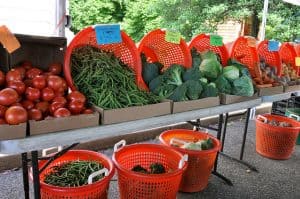 “I enjoy local foods.”
“I enjoy local foods.”
I say and I hear that statement more and more. And as we are right in the middle of another season, this seems like a good time to think about the good tastes among other reasons for supporting local food.
We know that agriculture is a big part of our economy. But where do local foods fit in that mix?
Small farms, those typically providing the local foods we enjoy, are growing, according to the U.S. Department of Agriculture (USDA). Across the country, as well as here in North Dakota, more farmers are involved in direct-to-consumer sales and/or are selling to grocers, restaurants, schools and institutions. A few are working actively with distributors to sell their products.
A stop in many communities finds a farmer market in operation. In addition, some farmers are selling directly to consumers from their farm or ranch. In some cases, what the farmer is offering is not only a local food but one that has some value-added component to it.
So what are local foods? How are they defined?
No consensus exists on a local foods definition. When asked, people will respond, “We know it when we see it.” No set mileage makes it local. Maybe the idea of a trade area might define it best. In a 2015 report, the USDA Economic Research Division measured it as food sold within 400 miles of its origin or within the state.
Local foods are also small businesses. They earn revenue and pay bills. Some of what they earn is money that might otherwise leave the local economy. Their purchases are often from local stores.
The average amount of income for a small farm varies widely (national average is approximately $35,000). This category includes everyone from the hobbyist to those who are supporting themselves and their family through dedication, hard work, great products and skillful marketing.
These local foods operations also use labor. At a minimum, the proprietor provides the labor. But many other small farms have other family members involved and may hire some outside labor at times.
And, just as with small businesses, you will find these leaders involved in local organizations, serving on boards and in elected positions. Because of their ties with the community, you will find strong local commitment and a deep sense of responsibility to give back.
So just as you appreciate your local business owner, take a moment to thank your local farmers and their part in our communities.
- About the Author
- Latest by this Author
Glenn Muske is an independent expert on rural small business, working as GM Consulting – Your partner in achieving small business success. He provides consulting, and writes articles for county extension agents and newspapers across North Dakota. Previously, he was the Rural and Agribusiness Enterprise Development Specialist at the North Dakota State University Extension Service – Center for Community Vitality.











As a daughter of a retired farmer, I wholeheartedly agree! I remember days when we had “U-picks” at the farm and the early mornings spent getting blackberries ready for the farmer’s market. I garden some myself but need to remember to visit my local markets as well. And I generally find the farmers are more than happy to share their tips and tricks and recipes–an added bonus. And from my visits to the grocery stores, I find getting goods directly from the farmer is generally price equivalent.